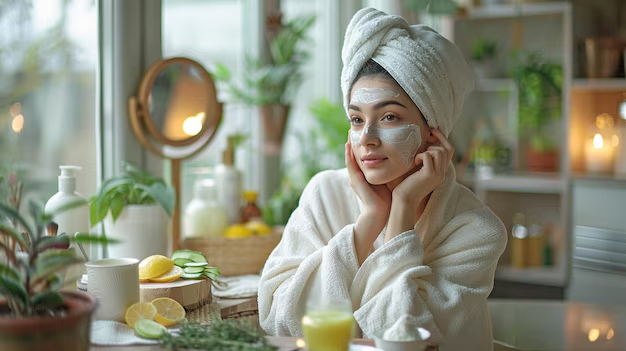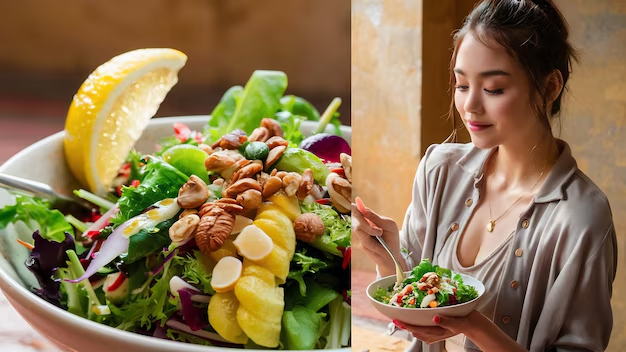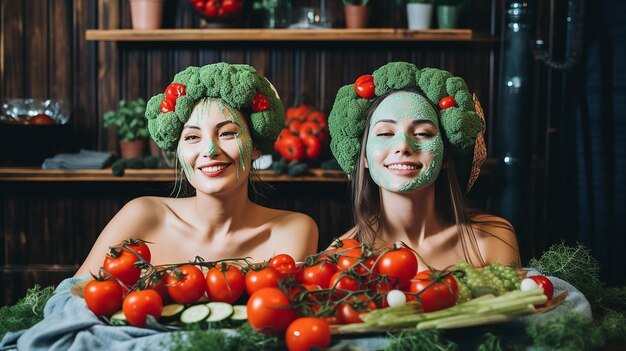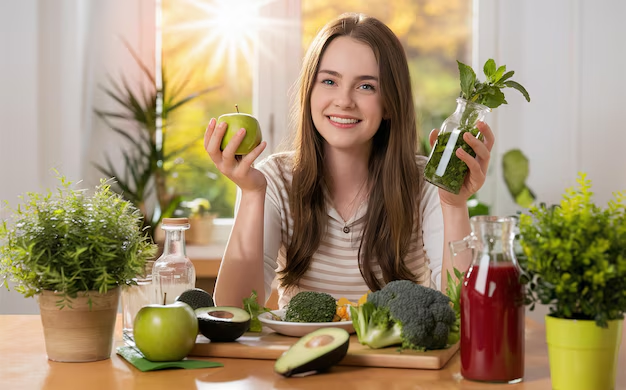Skin Health Diet: Foods To Eat And Avoid For Glowing Skin
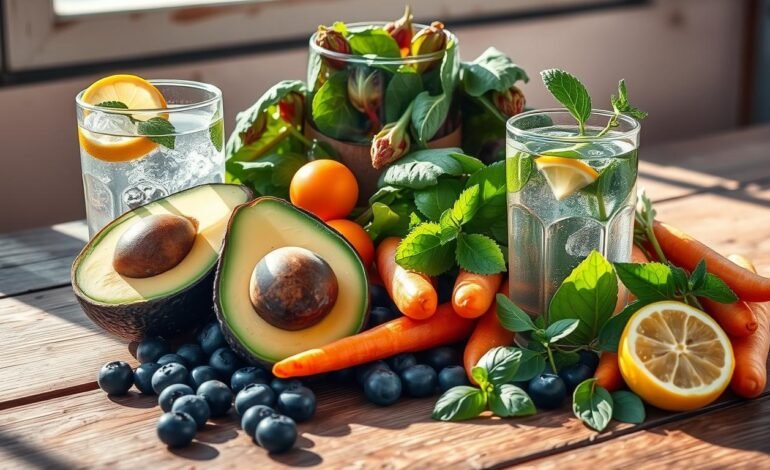
Skin Health Diet is the largest organ of the body. It regulates temperature, provides protection, and keeps fluid balance. A healthy diet greatly affects skin health and how it looks. Eating foods rich in fruits, vegetables, and essential nutrients helps protect the skin. It also reduces inflammation and makes the skin glow.
Important nutrients for skin health are vitamins A, C, and E, omega-3 fatty acids, and antioxidants. Even though more research is needed, studies show that a diet low in inflammation can make the skin look better. It also lowers the risk of chronic diseases.
Key Takeaways
- A balanced diet rich in fruits, vegetables, and essential nutrients can protect skin from damage and promote a glowing complexion.
- Key nutrients for skin health include vitamins A, C, and E, omega-3 fatty acids, and antioxidants.
- Reducing overall inflammation through diet can improve skin appearance and reduce chronic disease risk.
- Eating a skin-healthy diet can help prevent signs of aging and maintain a youthful, radiant complexion.
- Incorporating nutrient-dense foods like salmon, avocado, and broccoli can significantly benefit skin health.
Understanding the Connection Between Diet and Skin Health
Nutrition is key to healthy, glowing skin. The foods we eat can help or harm our skin. A balanced diet with essential nutrients can make our skin radiant.
How Nutrition Affects Skin Function
Some nutrients are vital for our skin’s health. Omega-3 fatty acids in fish, walnuts, and chia seeds keep our skin moist. Antioxidants in fruits and veggies fight off damage that causes aging.
The Role of Inflammation in Skin Health
Inflammation from bad diets can cause skin problems like acne and premature aging. Eating foods rich in healthy fats, antioxidants, and anti-inflammatory compounds can reduce inflammation. This helps our skin look clear and young.
Also Read : Why Hydrating Dry Skin Is Essential For A Healthy Complexion
Impact of Diet on Skin Aging
Our diet greatly affects how fast our skin ages. Eating too much processed food, sugar, and trans fats can harm our skin. On the other hand, a diet full of whole, nutrient-dense foods keeps our skin elastic and youthful.
“Consuming tomato paste regularly can help protect the skin from UV-ray damage, while richly-colored vegetables, fruits, herbs, spices, and dark chocolate have been shown to have protective properties for the skin.”
Also Read : Understanding The Skin Barrier And Its Role In Skin Health
Essential Nutrients for Radiant Skin
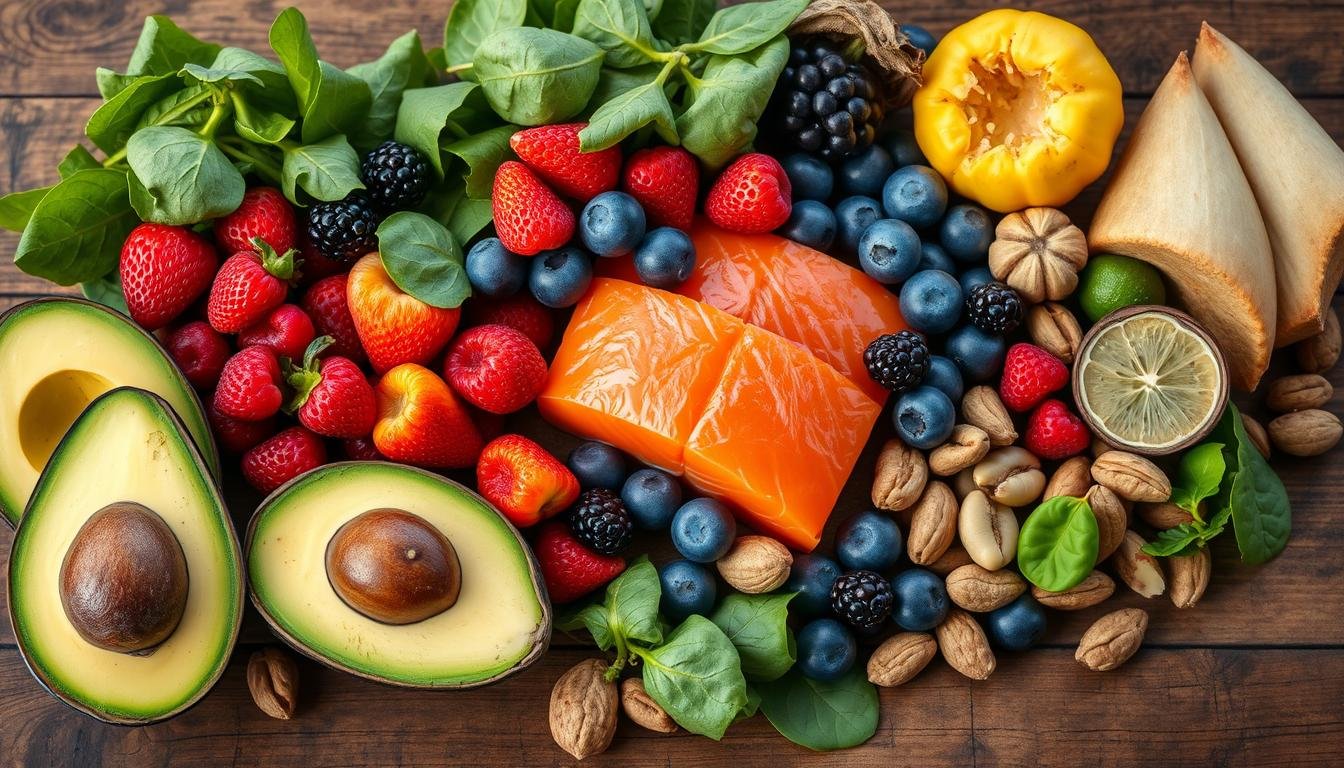
To get a glowing, youthful look, start by feeding your skin from the inside. Certain nutrients are key to keeping your skin healthy. Adding these to your diet can make your skin radiant and bright.
Omega-3 Fatty Acids
Omega-3 fatty acids are found in flaxseed and fatty fish. They are known for fighting inflammation. This helps stop skin cancer and keeps your skin looking young and bright.
Also Read : Understanding Hyperpigmentation: Causes And Treatment Options
Antioxidant Vitamins
Vitamin E protects skin cells from damage. Vitamin C is important for collagen and protects against UV rays. Eating foods rich in these vitamins can greatly improve your skin’s health.
Mineral Powerhouses
Zinc helps your skin heal and keeps oil glands working right. Selenium, found in Brazil nuts and fish, fights skin cancer and sun damage. It supports your skin’s natural defenses.
By focusing on these nutrients for skin, you can make your skin glow. This shows your vibrant health and well-being.
“Eating a diet rich in vitamin E, omega-3 fatty acids, and other skin-friendly nutrients can help you achieve a glowing, youthful complexion.”
Also Read : Seasonal Skincare Essentials For Every Weather Condition
Skin Health Diet: Power Foods for Glowing Complexion
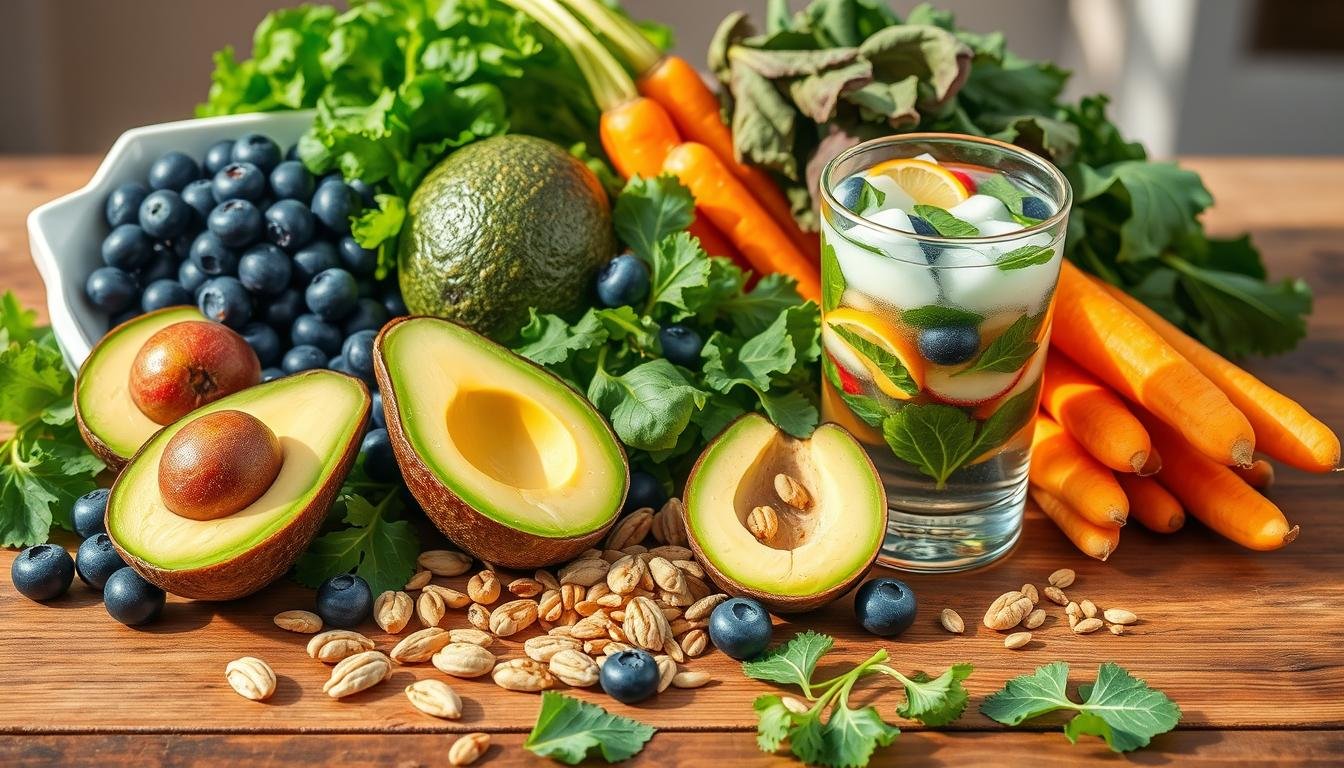
Getting a radiant, youthful look isn’t just about creams and serums. It begins with what you eat. Eating foods that are good for your skin can make it glow. Let’s look at some top foods that can help you get that glowing complexion.
Omega-3 Rich Foods
Fatty fish like salmon, mackerel, and herring are full of omega-3s. These are key for keeping your skin healthy and fighting inflammation. Avocados and vitamin E in them also help your skin. Walnuts and sunflower seeds are packed with omega-3s, antioxidants, and minerals too.
Also Read : The Best Glowing Skincare Secrets For Every Skin Type
Antioxidant-Packed Foods
Fruits and veggies like sweet potatoes, bell peppers, and broccoli are full of antioxidants. They have vitamins A and C, which protect your skin from harm. Tomatoes have lycopene, a strong antioxidant that fights sun damage. Even dark chocolate with lots of cocoa can make your skin more hydrated and thick.
Collagen-Boosting Foods
Red grapes have resveratrol, which may slow down skin aging. Green tea is full of catechins that protect your skin from the sun and improve its health. Adding these foods to your diet can give your skin the nutrients it needs to shine.
Hydration and Skin Health
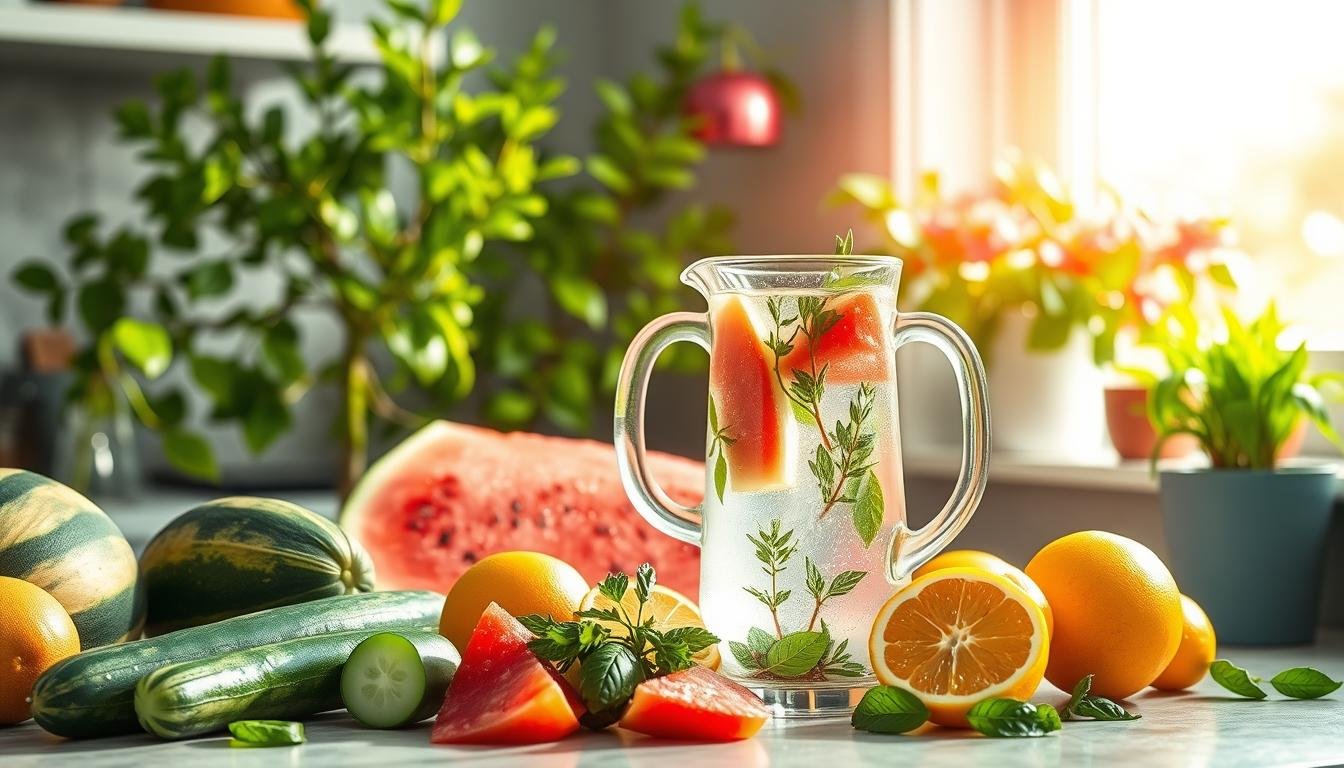
Drinking enough water is key for healthy, glowing skin. Experts say we should drink six to eight glasses a day. This helps keep our skin flexible and looking good.
Some fruits and veggies can also help us stay hydrated. Watermelon, for example, is over 90% water and packed with antioxidants. Oranges, with 80-89% water, are full of vitamin C. Spinach, with more than 90% water, is great for hydration too.
Even a little dehydration can make our skin look dry and tired. Drinking enough water keeps our skin soft and free of blemishes. A study showed drinking more water for 30 days improved skin health without changing its barrier or water loss.
Herbal teas, soups, and smoothies are good for our skin too. They give us fluids and important nutrients like omega-3s, vitamin C, and zinc. These nutrients help our skin look healthy and bright.
In short, drinking enough water, eating hydrating foods, and drinking other hydrating drinks is a simple way to improve skin and promote healthy skin. By avoiding dehydration, we can get the glowing skin we want.
| Water Content in Common Foods and Beverages | Percentage |
|---|---|
| Watermelon | 90%+ |
| Oranges | 80-89% |
| Spinach | 90%+ |
| Carrots | 80-89% |
| Broccoli | 80-89% |
| Yogurt | 80-89% |
| Pickles | 90%+ |
| Lettuce | 90%+ |
“Maintaining proper hydration is essential for achieving and preserving a healthy, radiant complexion. Drinking adequate water, along with consuming water-rich fruits and vegetables, can work wonders for the skin.”
Foods That Damage Skin Health
A balanced diet is key for healthy skin. But, some foods can harm your skin. Knowing which foods to avoid is important for your skin’s health.
High Glycemic Index Foods
Foods like biscuits and sugary drinks can harm your skin. They cause insulin spikes, damaging collagen and leading to wrinkles. It’s best to cut down on these foods for a youthful look.
Inflammatory Foods
Processed foods and fried snacks can cause inflammation. This can make acne worse. Cutting back on these foods can help reduce skin redness and irritation.
Processed Foods to Avoid
Fast food and junk food are bad for your skin. They have added sugars, unhealthy fats, and artificial additives. Alcohol and too much caffeine can also dry out your skin, making it look dull and aged.
Being careful about what you eat can help your skin. A balanced diet nourishes your skin from the inside. Remember, your skin’s health shows how well your body is doing.
Lifestyle Factors Supporting Dietary Changes
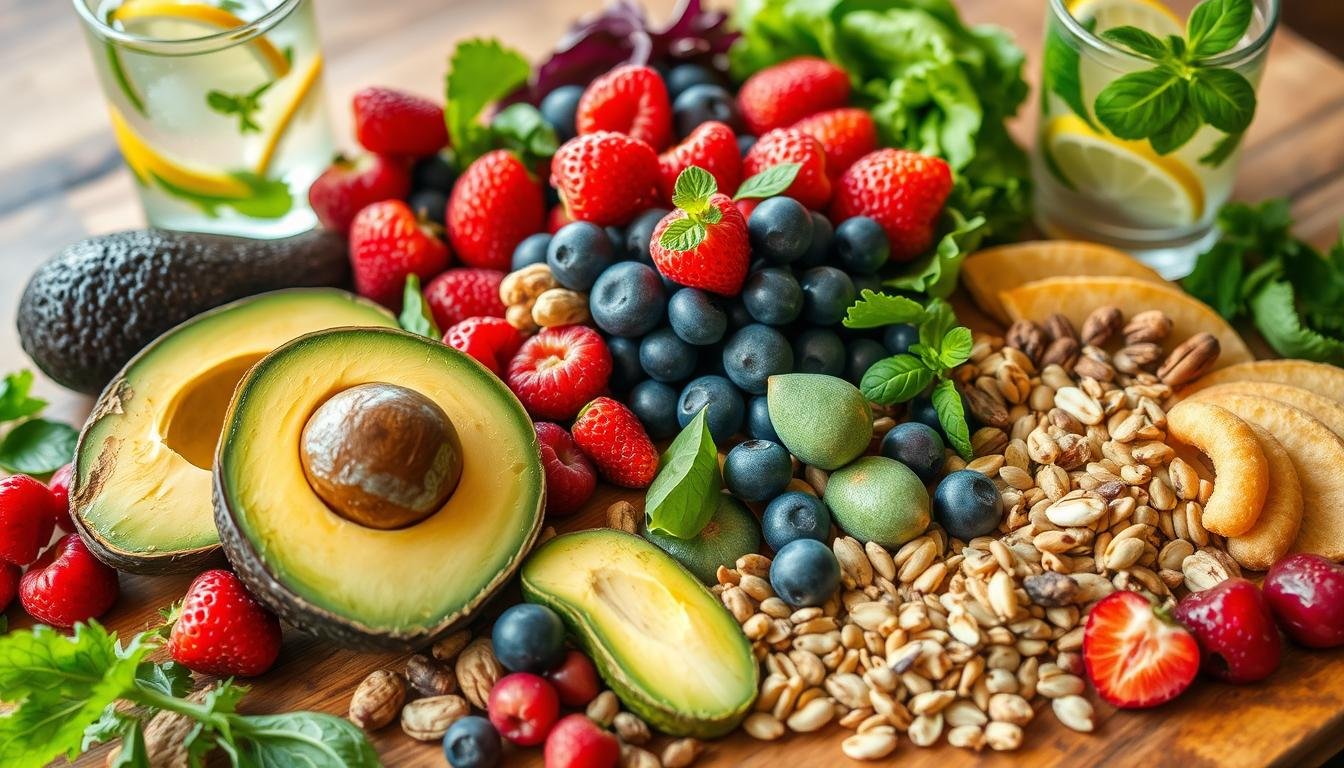
Many lifestyle habits are key to keeping your skin looking young and healthy. Regular exercise, proper sun protection, and more can help your diet work better. These habits improve your skin’s health.
Exercise Boosts Skin Health: Working out regularly boosts blood flow. This brings vital nutrients and oxygen to your skin cells. It helps your skin stay fresh and glowing.
The Importance of Sleep: Good sleep lets your skin fix and refresh itself. Not getting enough sleep can make skin problems worse and speed up aging signs.
Managing Stress for Skin: Too much stress can make skin issues like acne and eczema worse. Stress-reducing activities like meditation or yoga can help your skin stay healthy.
Sun Protection is Crucial: Not using sunscreen can cause early aging, wrinkles, and skin cancer. Always wear sunscreen and protective clothes to keep your skin young and healthy.
Avoiding Harmful Habits: Smoking and drinking too much alcohol can hurt your skin. They reduce blood flow and take away important nutrients. Quitting these habits can greatly improve your skin’s health.
Establishing a Skincare Routine: A good skincare routine, like gentle cleansing and moisturizing, can help your diet work better. It keeps your skin hydrated and supports its overall health.
By adding these lifestyle changes to a diet rich in skin-nourishing foods, you can achieve and keep vibrant, radiant skin.
Also Read : How Do Antioxidants Protect Skin from Damage?
Conclusion
A skin healthy diet is all about eating foods that are good for your skin. Focus on fruits, veggies, healthy fats, and lean proteins. Avoid processed foods, sugar, and unhealthy fats to see big improvements in your skin.
Drinking plenty of water, protecting your skin from the sun, and living a healthy lifestyle also help. These steps work together with what you eat to make your skin glow.
Everyone’s skin reacts differently to food, but a balanced diet and good skincare can make a big difference. Your skin’s health shows how well your body is doing overall. Eating right is key to a healthy body and skin.
Learning how diet affects your skin lets you take care of it better. Eating a healthy diet can help prevent damage and fix skin problems. By following these tips, you can get a radiant, youthful look that shows your inner health.
FAQs
Q: What are the best foods for healthy skin?
A: The best foods for healthy skin include fruits and vegetables rich in antioxidants, healthy fats like avocados and flaxseed, and foods high in vitamin E. Incorporating green tea into your diet can also provide anti-inflammatory properties that promote skin health.
Q: How does a healthy diet impact skin health?
A: A healthy diet plays a key role in the health of skin cells. It helps protect the skin from damage caused by free radicals, reduce oxidative stress, and can prevent skin conditions such as acne and premature skin aging.
Q: Are there specific foods you should avoid for better skin?
A: Yes, it is advisable to avoid foods high in saturated fats and sugars, as they can lead to inflammation and skin damage. Additionally, high glycemic index foods may contribute to acne and other skin issues.
Q: How can green tea benefit my skin?
A: Green tea is rich in antioxidants and has anti-inflammatory properties that can help protect the skin from oxidative damage and promote skin repair. Drinking green tea regularly can also boost your skin health.
Q: What role do healthy fats play in skin care?
A: Healthy fats, such as those found in avocados and flaxseed, are essential for maintaining moisture and elasticity in the skin. They can help keep skin hydrated and reduce the appearance of dry skin.
Q: Can diet really affect acne?
A: Yes, diet can significantly impact acne. Consuming a low glycemic index diet and incorporating foods for healthy skin can help regulate hormonal levels and reduce inflammation, which may lead to fewer breakouts.
Q: What are some health benefits of eating foods high in vitamin E?
A: Foods high in vitamin E provide antioxidants that protect the skin from oxidative stress and damage. They can also support skin repair, promote a smoother complexion, and help keep your skin looking youthful.
Q: How do antioxidants help improve skin health?
A: Antioxidants help combat oxidative damage caused by free radicals, which can lead to premature aging and skin conditions. Incorporating a variety of antioxidant-rich foods into your diet can promote healthier skin and protect against skin damage.
Q: What is the connection between gut health and skin health?
A: Gut health is closely linked to skin health, as a balanced gut microbiome can reduce inflammation and improve skin conditions. A diet rich in fiber, probiotics, and anti-inflammatory foods can support both gut and skin health.
Source Links
- https://www.piedmont.org/living-real-change/what-to-eat-and-drink-for-healthy-skin
- https://www.healthline.com/nutrition/12-foods-for-healthy-skin
- https://www.apexskin.com/2024/08/01/nutrition-and-skin-health-how-diet-affects-your-skin/
- https://pmc.ncbi.nlm.nih.gov/articles/PMC10982215/
- https://www.eastondermatology.com/blog/the-link-between-healthy-skin-and-a-healthy-diet
- https://www.webmd.com/beauty/nutrients-for-healthy-skin

